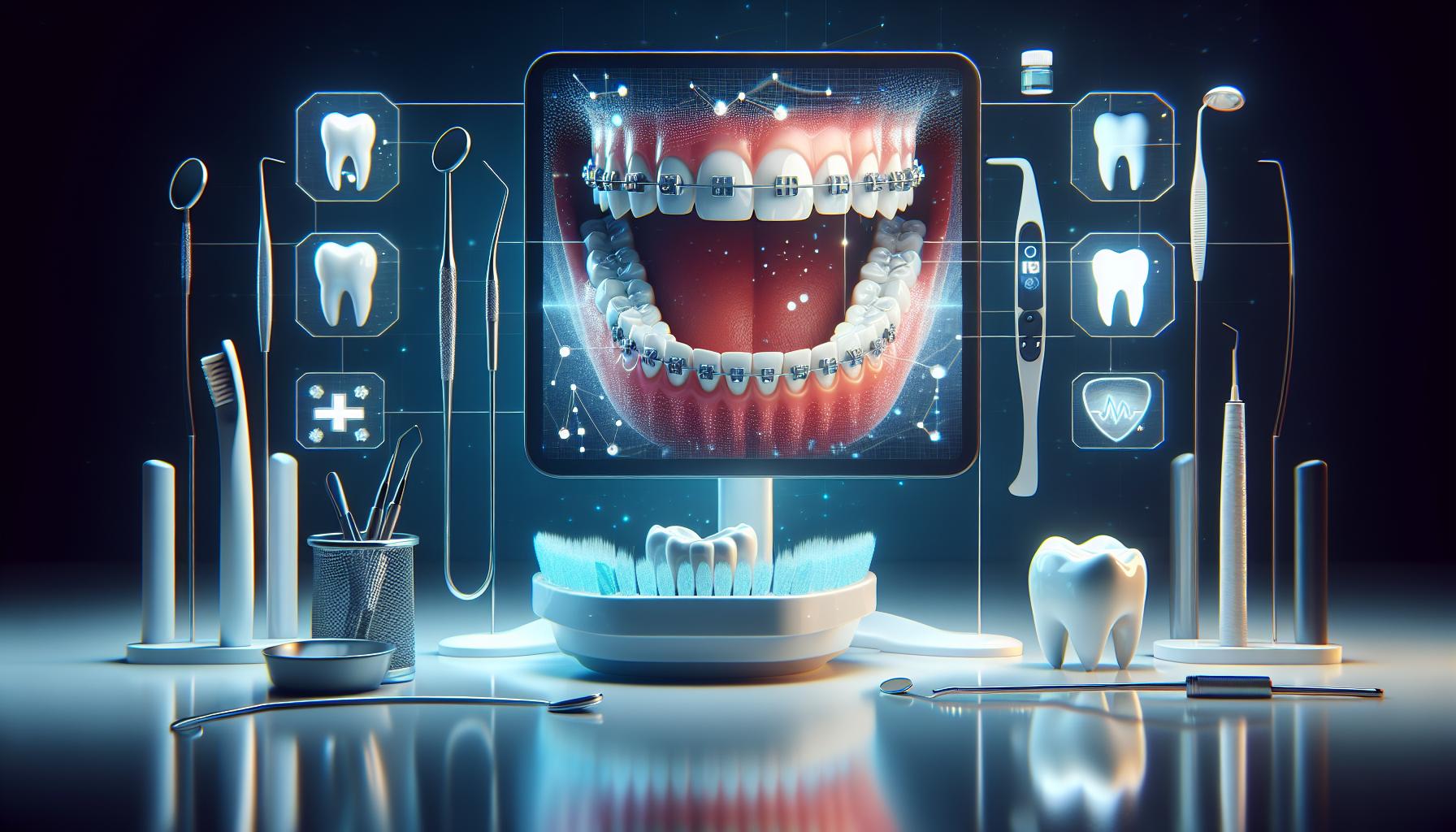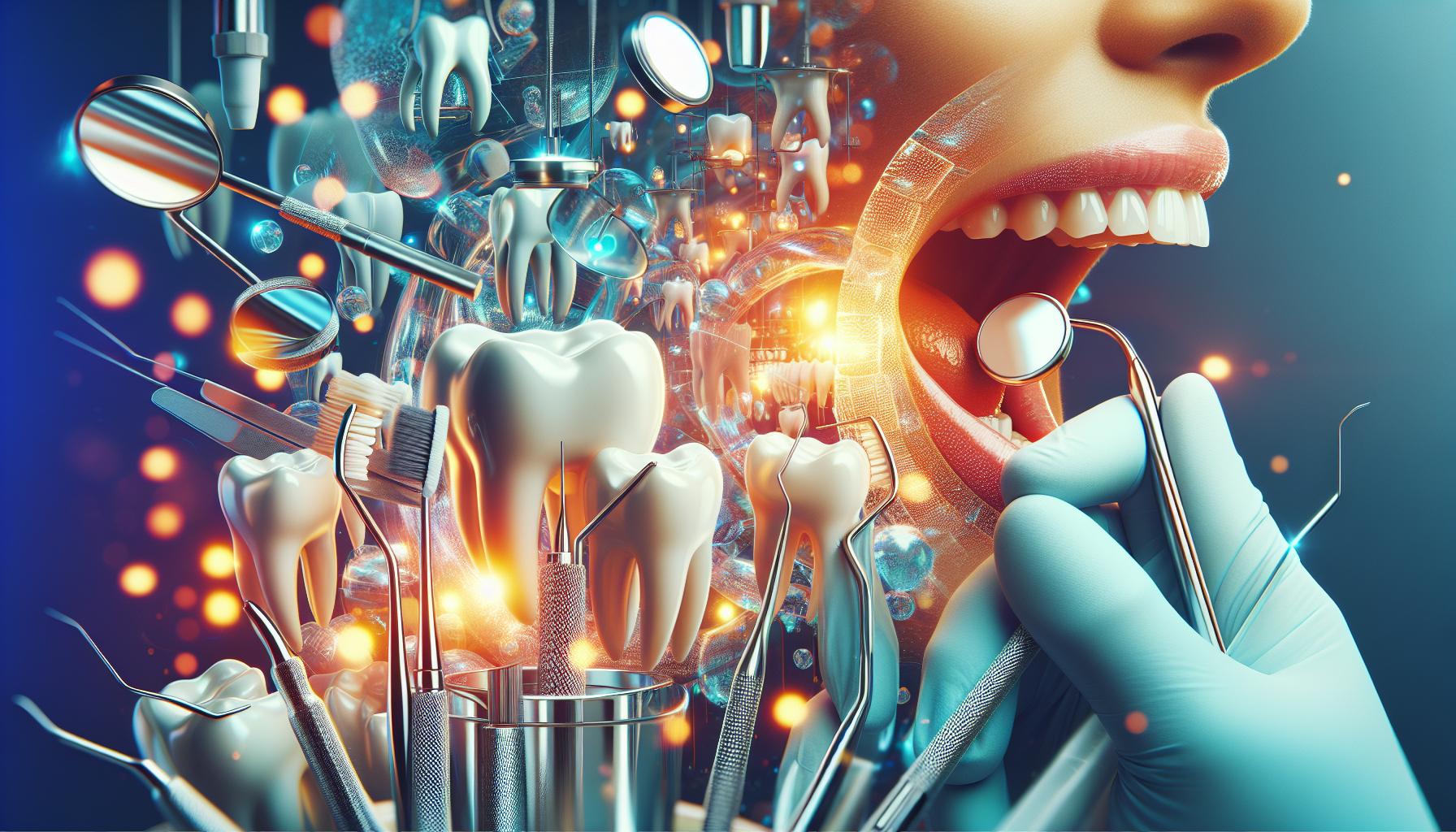Nail biting may seem like a harmless habit, but it can wreak havoc on your oral health, leading to significant damage to both teeth and gums. Understanding the impact of this common behavior is crucial for preserving your smile. Discover effective strategies to break the nail-biting cycle and protect your dental well-being.
Understanding the Habit of Nail Biting: What Drives it?
Nail biting is far more than just a nervous habit; it’s often an unconscious response to stress, anxiety, or boredom. This seemingly innocuous action can have significant repercussions, notably regarding oral health. In fact, it has been shown that the act of biting nails can directly contribute to dental issues, leading to a range of complications that impact not only the appearance of a smile but also its health. Understanding the drivers behind this habit is crucial for individuals seeking to break free from its grip.
triggers Behind Nail Biting
People who engage in nail biting often do so without realizing it,making it a challenging habit to overcome. Triggers for this behavior can vary widely from one individual to another. Some common triggers include:
- Stress and Anxiety: Individuals may bite their nails as a coping mechanism when faced with stressful situations.
- Concentration: Many report that they bite their nails when they are deep in thought or focused on a task.
- Boredom: In moments of boredom or inactivity, nail biting can become a way to engage the hands.
- Habitual Behavior: Like any habit, nail biting can become automatic, ingrained over time without conscious thought.
Understanding these triggers is key to developing strategies for breaking the habit and protecting oral health.
The Psychological Aspect
From a psychological standpoint,nail biting can be seen as a manifestation of deeper emotional issues. Research indicates that while some individuals are aware of their nail biting patterns, others may find themselves indulging in the habit without cognitive recognition of their actions [[3](https://pmc.ncbi.nlm.nih.gov/articles/PMC7497389/)]. This unconscious biting can lead to a Cycle of Shame, where individuals feel guilty or embarrassed about their habit, which in turn can exacerbate anxiety and perpetuate the behavior.Moreover, effective interventions often involve breaking this cycle through awareness and mindfulness techniques. Incorporating visual cues, such as wearing band-aids on fingers or using bitter-tasting nail polish, can serve as reminders to avoid biting. In studies of individuals attempting to curb this habit, those who employed visual deterrents were significantly more successful than those who did not [[1](https://psychology-spot.com/nail-biting-how-to-stop-the-habit/)].
The impact on Oral Health
Understanding the habit of nail biting is crucial, especially when considering how it relates to dental health. As highlighted in discussions about the repercussions of biting nails on teeth, the constant pressure and force applied during nail biting can lead to chipped or cracked teeth.This damage not only detracts from the beauty of one’s smile but may also necessitate dental interventions ranging from fillings to more extensive restorative procedures.
Ultimately, recognizing the psychological triggers and effects of nail biting is essential in addressing the habit. By committing to understanding and modifying this behavior,individuals can not only improve their mental well-being but also protect their dental health from the damaging effects of biting nails. It’s about taking proactive steps towards healthier habits that safeguard both mind and smile.
Recognizing the Signs: How Nail Biting Affects Your Teeth

Nail biting is more than just a nervous habit; it can lead to a host of dental issues that may compromise your smile.Many individuals underestimate the potential damage from this seemingly innocent action. The force exerted when biting nails can disrupt the alignment of your teeth, create gaps, and lead to crowding, especially in those who have had braces in the past. This can result in not only cosmetic concerns but also functional difficulties in achieving a proper bite.
Physical Effects of Nail Biting on Teeth
Nail biting can cause a range of physical dental issues, which include:
- Teeth Misalignment: Regular nail biting can apply excessive pressure that may shift teeth over time, leading to misalignment.
- Tooth Damage: The habit can chip or crack teeth, particularly the front teeth, as they come into contact with the hard surface of the nails.
- Gum Recession: The pressure from biting nails can irritate the gums, causing them to recede and increasing the risk of periodontal diseases.
- Increased Risk of Bruxism: Nail biters are often more likely to grind their teeth,which can lead to headaches,facial pain,and further tooth sensitivity
Behavioral Triggers to Watch For
Understanding when and why you bite your nails is crucial in mitigating its effects on your teeth.Common triggers include:
- Stress or Anxiety: many individuals find themselves biting their nails during stressful situations, leading to a vicious cycle of habit and dental damage.
- Boredom: biting can become a default action when you’re feeling bored or restless, prompting mindless nibbling.
Becoming aware of personal triggers can be a stepping stone toward breaking the nail-biting cycle. Keeping a notebook or using a mindfulness app to record instances of nail biting can be a productive method to identify patterns and develop strategies to overcome this habit.
Protecting your Smile
So, how can you guard against the dental consequences of nail biting? Here are some actionable steps:
- Substitute the Habit: Find a healthier option to engage your hands, such as fidget toys, stress balls, or even a simple pen.
- Regular Dental Checkups: Schedule routine visits to the dentist to monitor your teeth’s health and catch any potential damage early.
- Awareness and Intervention: Simply becoming aware of when you bite your nails can lead to corrective action—consider wearing bitter-tasting nail polish designed to deter nail biting.
recognizing how nail biting damages teeth is essential in protecting your smile. With conscious effort and the implementation of these strategies, you can take significant strides towards ensuring your dental health remains uncompromised by this habit. Remember,a healthy smile starts with awareness and proactive measures.
The Hidden Costs: Exploring the Dental Damage from Nail Biting
Biting your nails often seems like a harmless habit, but the repercussions for your dental health can be significant and surprising. Many may not realize how this common activity can lead to serious dental issues, affecting not just appearances but also long-term oral health. In fact, the impact of nail biting extends far beyond simply damaging the nails; it can also wreak havoc on your teeth, gums, and overall oral hygiene.
The Consequences of Nail Biting on Oral Health
Nail biting can lead to a variety of dental problems, including:
- Cracked and Broken Teeth: The pressure exerted while biting nails can chip or crack the teeth. Over time, this can result in significant dental issues, requiring costly procedures to repair.
- Gum Damage: The act of biting can inadvertently cause abrasions or injuries to the gums, leading to increased bleeding and a higher risk of infections.
- Misalignment: Consistent nail biting can alter the position of your teeth, leading to misalignment and bite issues that may necessitate orthodontic treatment.
Moreover, nail biting can lead to an increase in bacteria in the mouth.Nails are often not as clean as we assume; they can harbor a variety of germs that, when transferred to the mouth, contribute to oral infections or exacerbate existing dental problems, including gum disease and cavities [1[1[1[1][2[2[2[2].
Statistics highlighting the Issue
Understanding the prevalence of nail biting can put the issue into outlook. Research indicates that:
| Age Group | Incidence of Nail Biting |
|---|---|
| 7-10 years | Up to 33% |
| 10-19 years | 45% |
| 20 years and older | 5% |
These statistics show that nail biting is particularly prevalent among children and teenagers, highlighting the importance of addressing this habit early on to protect future dental health [3[3[3[3].
Practical Solutions for Preventing Nail Biting
Breaking the nail-biting habit is crucial not only for your nails but for your dental health as well. Here are some actionable steps to consider:
- Identify Triggers: awareness of what prompts nail-biting—whether stress, boredom, or anxiety—can help you develop strategies to manage those triggers.
- Keep Nails Trimmed: Maintaining short nails can lessen the temptation to bite.
- Use Bitters or Nail Polish: Applying a bitter-tasting nail polish specifically designed to deter nail biting can be effective.
- Engage in Stress-Relief Techniques: Practicing mindfulness, yoga, or other relaxation methods can help reduce the urge to bite.
Incorporating these practices into your daily routine can significantly diminish the urge to bite your nails, thus protecting your smile and enhancing your overall oral health. Understanding the dental damage caused by nail biting is the first step to combating this habit and preserving your teeth for the future.
Simple Solutions: Techniques to Break the Nail Biting Cycle
Biting your nails can lead to more than just unsightly hands; it poses a risk to your dental health as well. Implementing effective techniques to curb this habit not only improves your appearance but also protects your smile from potential damage caused by this compulsive behavior. Here are some practical strategies to help you break the cycle of nail biting.
Visual Reminders
One effective approach to halting nail biting is to utilize visual cues that remind you of your goal. Consider the following methods:
- Wear Nail Polish: Applying a bitter-tasting nail polish designed specifically to deter nail biting can serve as a powerful deterrent. Whenever you bring your fingers to your mouth, the unpleasant taste will prompt you to stop.
- Use Stickers or Band-Aids: Covering your nails with decorative stickers or band-aids can serve as a barrier, making it more difficult to bite your nails. This visual cue creates an additional layer of affirmation that you want to protect your nails and teeth.
Gradual Reduction Techniques
If going cold turkey feels overwhelming,consider a more gradual approach. Instead of trying to stop biting all your nails at once, focus on one nail or hand at a time:
- Choose One Nail: Start by designating just one nail, perhaps your thumb, as the “no bite” nail. Once you have successfully refrained from biting that nail for a week, add another nail to the “protected” list.This incremental method makes the goal seem more achievable.
- Set Time Goals: Aim for a specific duration each day where you won’t bite your nails, gradually increasing the time as you gain confidence. For example, set a timer for one hour to avoid nail biting, progressively extending it over time.
Stress Management Techniques
Since nail biting is often a response to stress or anxiety, adopting relaxation techniques can help address the underlying triggers:
- Meditation and Breathing Exercises: Incorporating mindfulness practices can help reduce anxiety levels. Allocate a few minutes each day to practise deep breathing or guided meditation, which can ultimately diminish the urge to bite your nails.
- Keep Your Hands Busy: Engage in activities that keep your hands occupied, such as knitting, doodling, or using stress balls. The more your hands are busy, the less likely you are to bring them to your mouth.
By implementing these techniques, you can significantly reduce nail biting and protect your smile from its harmful consequences. Remember, breaking a habit takes time and persistence, but with a solid plan, you can achieve healthier nails and teeth in no time.
Prevention Strategies: Protecting Your Smile from Nail Damage
Biting nails is more than just a nervous habit; it can lead to significant dental issues that compromise your smile. The pressure and friction from teeth chomping on the nails can not only weaken tooth enamel but also result in misalignment and other dental problems. Fortunately, there are effective strategies you can implement to prevent nail biting and protect your oral health.
Identify Triggers
The first step to breaking the habit of nail biting is recognizing the triggers that prompt it. Keeping a journal can definitely help identify patterns in your behavior. Is it stress, boredom, or anxiety that drives you to nibble on your nails? Once you know your triggers, you can develop healthier coping mechanisms, such as:
- Stress Management: Engage in relaxation techniques such as deep breathing, meditation, or yoga.
- Distraction Techniques: Use fidget toys or stress balls to keep your hands busy.
- Mindfulness Practices: Focus on being present and aware of your nail-biting habits.
Strengthen Your Nails
Another proactive way to protect your smile is by enhancing the condition of your nails. Strong, healthy nails are less likely to be bitten. You can achieve this by:
- Maintaining regular manicures to keep nails trimmed and polished.
- Applying bitter-tasting nail polish specifically designed to deter nail-biting.
- Consider using vitamin-enriched nail treatments to strengthen weak nails.
Seek Professional Help
If nail biting becomes a persistent issue, don’t hesitate to seek help. Dentists can provide you with tailored advice based on the specific damage your teeth have incurred.Moreover, behavioral therapists can work with you on techniques to manage anxiety and change habits, contributing significantly to long-term success in breaking the cycle of biting.
| Strategy | Description | Effectiveness |
|---|---|---|
| Identify Triggers | Recognizing what causes your nail-biting. | High |
| Strengthen Your Nails | Using treatments to reinforce nails. | Medium to High |
| Professional Help | Consulting therapists or dentists for guidance. | High |
By incorporating these strategies, you not only improve the health and appearance of your nails but also safeguard your teeth from the damaging effects of nail biting. Making these changes can enhance your overall oral health and protect your smile for years to come.
Professional Insights: When to Seek Help for Nail Biting

Biting your nails may seem like a harmless habit, yet it can lead to serious problems not just for your nails but also for your oral health. When nail-biting becomes chronic,it can cause dental issues over time,such as misalignment,chipped teeth,and increased risk of infection. Understanding when to seek professional help is crucial for addressing the underlying causes of this behavior and preventing further damage.
Recognizing the Signs Needing Support
Engaging in nail-biting can frequently enough stem from stress, anxiety, or other emotional challenges. If you find yourself biting your nails to the point of causing physical damage to the nail, cuticle, or surrounding skin, it’s a clear signal to seek help from a professional. Persistent nail-biting may also indicate obsessive-compulsive disorder (OCD) or body-focused repetitive behavior (BFRB), both of which can be effectively managed through therapy. Noticing signs such as severe embarrassment about your nails or feelings of guilt post-biting can highlight the need for intervention.
When Professional Guidance Is Necesary
If you’re uncertain about the seriousness of your nail-biting habit, consider these key indicators that suggest it’s time to consult with a professional:
- Physical Damage: If your nail-biting habit is causing significant damage to your nails or surrounding skin, including signs of infection like redness, swelling, or pain, it is essential to seek a dermatologist or healthcare provider’s advice.
- Emotional Distress: If nail-biting is leading to feelings of shame, anxiety, or depression, talking to a mental health professional can provide strategies to cope and address the triggers of your behavior.
- Interference with Daily Life: If you notice that your habit affects your social interactions or self-esteem, professional insights can help you tackle the underlying psychological factors.
- Dental Concerns: Given the association of nail-biting with dental issues, consulting a dentist may be advisable if you experiance tooth damage or alignment issues.
Building a Support System
Consider enlisting a support buddy who can provide encouragement when you feel the urge to bite your nails. Sharing your goals with someone can increase accountability and help you navigate challenging moments more effectively.Additionally,seeking therapy or counseling offers an advanced network for coping techniques,and professionals can recommend specific exercises that promote mental wellness,reducing the need to engage in harmful behaviors.
professional insights, particularly about how biting nails damages teeth and contributes to broader emotional and physical issues, can illuminate paths toward healthier habits. Remember,acknowledging the problem is the first step toward reclaiming not only your nails but also your confidence and smile.
alternative Approaches: Finding Stress Relief Beyond Nail Biting
Nail biting is often a subconscious response to stress or anxiety, but there are effective strategies to channel that energy into healthier habits. By recognizing the factors that trigger this behavior, you can explore alternative methods to achieve stress relief, ultimately protecting both your teeth and your well-being.
Understanding the Triggers
It’s essential to identify what leads to your nail-biting episodes. Common triggers include high-pressure situations, boredom, or even certain emotional states. By pinpointing these moments, you can proactively address them with healthier coping mechanisms. For instance, if you tend to bite your nails during work-related stress, implementing breaks for deep breathing or speedy physical exercises can provide relief without damaging your teeth.
Alternative Stress Relief Techniques
Finding satisfying alternatives to nail biting can transform your experience of stress.Here are some effective approaches:
- Mindfulness and Meditation: Engaging in mindfulness exercises helps ground you in the present moment.This practice can significantly reduce anxiety levels and the urge to bite your nails.
- Physical Activity: Regular exercise, even if it’s just a brisk walk, can elevate your mood by releasing endorphins, which act as natural stress relievers.
- Creative Outlets: Channeling your energy into activities like drawing, writing, or crafting can serve as an excellent distraction from the urge to bite your nails.
- Fidget Tools: Consider using stress balls, fidget spinners, or textured hand grips to keep your hands busy and away from your face.
By integrating these alternatives into your daily routine, not only can you diminish the habit of nail biting, but you also create a more positive and fulfilling way to cope with stress.
Seeking Professional Help
If the habit continues to adversely impact your life or the health of your teeth, talking to a mental health professional might be beneficial. They can provide personalized strategies tailored to your specific triggers and help you develop a complete approach to stress management.
By taking proactive measures and focusing on healthier coping strategies, you can break the cycle of nail biting, safeguard your teeth from damage, and discover effective ways to manage stress. The journey may require some effort, but the dividends of improved dental health and reduced anxiety are well worth it.
Building Healthier Habits: Tips for a Confident Smile
Did you know that one of the most common habits among individuals is nail-biting? This seemingly innocuous action can lead to significant repercussions for your oral health. Beyond just unsightly nails, biting your nails can result in chipped or damaged teeth, gum infections, and misalignment of your bite. Adopting healthier habits can pave the way for a confident smile and mitigate the risks associated with practices like nail-biting.
Establish Awareness and Mindful Practices
The first step in breaking the nail-biting habit is becoming aware of when and why you do it. Many times,people bite their nails as a response to stress or boredom. By acknowledging these triggers, you can develop alternative strategies to cope with those feelings. Here are some practical tips to cultivate mindfulness:
- Keep a Journal: Document moments when you feel the urge to bite your nails. Recognizing patterns can definitely help you address the underlying issues.
- Practice Deep Breathing: When anxiety strikes, take a moment to breathe deeply. This simple act can divert your focus away from your nails.
- Use Fidget Tools: Consider using stress balls or fidget spinners to keep your hands busy and away from your mouth.
Oral Hygiene and Nail Care
Taking care of your nails is just as crucial as maintaining your oral hygiene. Regular manicures or simply keeping your nails trimmed can deter you from biting them.The less length they have, the lesser the temptation. Additionally, consider the following strategies for preserving both your nails and your smile:
| Tip | Description |
|---|---|
| Use Bitter Nail Polish | Applying a bitter-tasting nail polish can serve as a physical reminder to stop biting. |
| Strengthen Your Nails | Invest in nail strengtheners that prevent breakage and reduce the desire to bite. |
| Regular Dental Check-Ups | Schedule routine visits with your dentist to ensure your teeth and gums remain healthy,mitigating any damage caused by biting. |
By integrating these actionable tips into your daily routine, you’ll not only combat the habit of nail-biting but also promote healthier teeth and gums.In essence, recognizing the link between your habits and your oral health is vital in your journey towards a beautiful, confident smile.
FAQ
how does nail biting damage my teeth?
Nail biting can have several detrimental effects on your dental health. Firstly, the pressure exerted during the biting action can lead to tooth wear and tear. This can result in uneven teeth surfaces, leading to issues like sensitivity and increased risk of cavities. Over time, consistent nail biting can also wear down the enamel, the protective outer layer of your teeth, which is crucial for preventing decay.
Additionally,biting nails may contribute to misalignment. This misalignment occurs as the force exerted on teeth can affect their positioning over time, potentially leading to a malocclusion (improper bite). Such changes can complicate dental health and may require orthodontic treatment in the future.
What are the other potential health issues associated with nail biting?
Nail biting is not just a dental concern; it can impact your overall health as well. Such as, biting your nails can lead to infections.Your nails can harbor bacteria and germs that can easily transfer into your mouth. This action can result in various illnesses ranging from mild stomach issues to more severe infections.
Moreover, nail biting can sometimes be associated with stress and anxiety. If someone feels compelled to bite their nails,it may highlight underlying emotional distress or tension. Recognizing and addressing the root cause of this habit is crucial for both mental and dental health.
How can I break the habit of nail biting?
Breaking the habit of nail biting takes time and patience,but there are effective strategies to help you. One way is to keep your nails trimmed short; this minimizes the amount of nail available to bite.Also, consider applying a bitter-tasting nail polish that discourages biting. These over-the-counter products can serve as a constant reminder to keep your hands away from your mouth.
Another helpful technique is to find alternative actions to distract yourself. engage your hands with fidget toys, stress balls, or even doodling and drawing. This keeps your hands occupied and can reduce the urge to bite your nails.
Are there any protective measures to help my smile if I keep biting my nails?
If nail biting is a persistent habit, certain protective measures can help mitigate the damage. Wearing a mouth guard, especially at night, can protect your teeth from wear and tear due to biting. Dentists often recommend custom-fit mouth guards that are comfortable and effective at reducing damage.
Moreover, maintaining diligent oral hygiene is essential.Regular brushing and flossing can help remove any bacteria that may enter the mouth through nail contact. Routine dental check-ups are also vital. Your dentist can monitor any potential damage and offer professional advice tailored to your situation.
How significant is it to address nail biting early?
Addressing nail biting early is crucial for preventing long-term damage. The earlier you acknowledge this habit and start taking steps to change it, the better your dental health will be in the long run.Neglecting the issue can lead to various complications, including tooth loss and extensive dental work, which can be both expensive and time-consuming.
Children, in particular, should be encouraged to break this habit early. As their teeth are still developing,the consequences of nail biting may be even more pronounced. Parents can play an active role by promoting healthy habits and providing supportive outlets for stress and anxiety.
What are the signs that nail biting is affecting my teeth?
You may notice several signs if nail biting has started to impact your dental health. Common indicators include increased tooth sensitivity, noticeable wear on the edges of your teeth, or visible chips and cracks. If you find it painful to chew or experience frequent headaches, these could also signal dental issues caused by nail biting.
Additionally,if you observe changes in your bite or alignment—such as teeth not fitting together perfectly—or if your gums appear swollen or inflamed,it’s a good idea to consult with a dentist. They can conduct a thorough examination to identify any damage and suggest appropriate treatment options.
Future Outlook
Protecting Your Smile: Key Takeaways
Biting your nails might seem harmless, but it can lead to serious dental issues. Here’s a quick recap of how this habit can affect your teeth:
- Pressure on Teeth: Nail biting can create significant pressure on your teeth, leading to misalignment and gaps over time, which may require orthodontic treatment [1[1[1[1].
- Enamel wear: The constant friction from biting nails can wear away tooth enamel, making your teeth more vulnerable to decay [1[1[1[1].
- Risk of Injury: This habit can cause teeth to chip or break, posing long-term risks to your oral health [2[2[2[2].
- Gum Issues: Nail biting can contribute to gum problems, including gingivitis, which can affect your overall oral hygiene [3[3[3[3].
Next Steps to Protect Your Smile
- Identify Triggers: Keep a journal of when you bite your nails to figure out what triggers the habit.
- Seek Alternatives: Try stress-relief techniques or fidget toys to keep your hands busy.
- Consult Professionals: Talk to your dentist about strategies to break the habit and protect your teeth.
By taking proactive steps, you can safeguard your smile from the harmful effects of nail biting. For more insights on maintaining excellent oral health, stay tuned and keep exploring our content! Your smile deserves the best care.








